- Home
- Michael Bond
Monsieur Pamplemousse Aloft
Monsieur Pamplemousse Aloft Read online
Monsieur
Pamplemousse
Aloft
Michael Bond
CONTENTS
Title Page
1 SOMETHING IN THE AIR
2 A SURFEIT OF NUNS
3 TRUFFLE TROUBLE
4 THE SIX GLORIES OF FRANCE
5 A TOUCH OF PNEUMATICS
6 THE MORNING AFTER
7 THE BALLOON GOES UP
8 DEATH BY MISADVENTURE
9 DINNER WITH THE DIRECTOR
About the Author
By Michael Bond
Copyright
1
SOMETHING IN THE AIR
Pommes Frites saw it first; a small object shaped like a sausage and about the size of a double magnum of champagne. Its silver body gleamed in the early morning sun as it emerged from the comparative gloom of the Boulevard de la Tour-Maubourg in the seventh arrondissement of Paris and entered the Place de Santiago-du-Chili. Gliding along at roof-top level, it disappeared for a moment or two behind some trees, nosed its way slowly and silently along one side of the Place, eventually reappearing outside the Chilean Embassy on the corner of the Avenue de la Motte-Picquet. There it paused in its travels, gaining height momentarily, as though trying to discover what secrets lay behind the facade of the white stone building. Then, curiosity apparently satisfied, it executed a sharp 270-degree turn to port and went on its way again, following a course running parallel to the outer wall of the Hôtel des Invalides, home amongst other things, to the remains of the Emperor Napoleon.
Pommes Frites’ immediate reaction on catching sight of it had been one of incredulity; incredulity which quickly gave way to apprehension. He still had vivid memories of a recent journey he had undertaken in the Pyrénées Orientales suspended beneath his inflatable kennel. It had been an unhappy experience and one he had no wish to repeat. Gathering himself together, he gave vent to a warning howl, vaguely, but in the circumstances not inaptly, reminiscent of an air-raid siren.
However, to have awarded Pommes Frites bonus points for his powers of observation would have been doing less than justice to those others who were abroad that morning. It was barely nine-thirty and most passers-by had their minds on other, more pressing matters – like getting to work on time. The overalled worker in the tiny triangular railed-in park outside the Metro station was busy watering his roses, while the taxi-drivers waiting in a line nearby had their eyes firmly fixed on lower horizons.
The truth of the matter was, Pommes Frites only happened to strike lucky because, having raced on ahead of his master, he alone in the Place de Santiago-du-Chili was gazing up at the statue of Vauban just as the object floated past. Not many, other than those with a passion for history, paused to give the statue so much as a passing glance at the best of times, and Pommes Frites was only looking at it for want of something better to do while bestowing his favours on a convenient tree. Far from centering his thoughts on the past exploits of one of France’s most famous military engineers, he was wondering idly whether, if he kept very still, a pigeon perched on top of the good Marshal’s hat might be lulled into a false sense of security and land on his own head by mistake. Pommes Frites didn’t have a very high opinion of pigeons and although he had never actually caught one, he refused to discount the possibility.
Rotating himself as far as was practicable while standing on three legs, he watched the object pass overhead. Ignoring any possibilities the Café l’Esplanade on the corner of the Place might have in the way of refreshment, oblivious to the landing facilities offered up by the Esplanade des Invalides below and to its right, the object gained height again and with gathering speed disappeared over the top of some nearby buildings just as Monsieur Pamplemousse came up out of the Metro.
Much to Pommes Frites’ disappointment, his master barely gave it a second glance. He, too, had other, more important things on his mind. Having registered the object, he dismissed it as a mere toy; the temporary plaything of some spoilt brat who lived in the nearby sixteenth and whose parents had more money than sense. Only the week before he’d seen a miniature tank in one of the department stores on the Boulevard Haussmann. The price had been more than the cost of his own car.
The possibility that its presence might have anything to do with his being summoned at an unusually early hour for a meeting with the Director didn’t cross his mind.
Monsieur Pamplemousse mistrusted such summonses – especially when they happened to come during the middle of breakfast, and even more so when by rights he should be enjoying a well-earned week off from his travels. Doucette had not been best pleased at the news. He had promised to take her shopping that morning for some new curtain material. There had been much banging of crockery in the kitchen and he’d had to exercise care with his croissant lest too many crumbs found their way onto the floor. It had not been a good start to the day.
As they took advantage of a gap in the traffic and crossed the road a feeling of gloom set in. Even the all-pervading smell of fresh lime from the trees surrounding the Esplanade, normally sufficient to put him in a good humour whatever the circumstances, failed to have its usual effect. The thought he had been entertaining of telephoning Doucette when he reached the office – just to see how she was getting on – no longer seemed such a good idea. She would start asking questions about what time she could expect him back and would he want lunch and if so, what? He would become irritated because he would have no idea of the answer.
He paused at the corner of the Place, wondering whether he should stop by at the café for a quick eau-de-vie – a little ‘Dutch courage’. If he was honest he had another reason besides shopping for not wanting to go into the office that morning. Madame Grante was on the warpath, and when Madame Grante was on the warpath, ‘retreat’ was the only sensible course. Sniping was prevalent and mortar fire unremitting in its intensity.
The current hostilities had to do with his last assignment for Le Guide, an assignment which had not been of his making, and which through no fault of his own had involved him in expenditure over and above that normally agreed to in staff regulations. Expenditure of a kind which, when detailed in black and white on a P39, made Madame Grante’s lips – which could never by any stretch of the imagination be described as full, let alone generous – become so compressed it was hard to tell where the bottom one finished and the top one began, except when they parted company in order to permit the escape of some freshly barbed comment. Things had reached such a pass that instead of eating in the canteen he had taken to having sandwiches sent up to his room rather than run the risk of bumping into her in a corridor, knowing full well that she was probably lying in wait for him.
He could hear her voice now as she reeled off the list from his claim sheet, savouring each and every word in tones which would not have disgraced a leading member of the Comédie Française reciting her favourite piece to the back row of the fauteuils.
‘Braided nylon fishing thread, fifty metres. One cylinder of gas, helium, large. Photographic chemicals, various. Inflatable dog kennel, one. Twenty-two pairs of ladies’ culottes, black …’
It was the unfairness of it all that particularly grieved Monsieur Pamplemousse. His expenses sheet should never have arrived on Madame Granted desk in the first place, and wouldn’t have done so had it not been for a clerical error somewhere along the line. It had been intended for the eyes of certain unnamed people in a department of the Ministry of the Interior. Promises had been made. Secrecy had been the order of the day.
In the end he had gone to the Director and asked him to put his foot down. Very reluctantly the Director had agreed.
There the matter should have ended, and in the normal course of events would have done, had it not
been for the fact that it wasn’t in Madame Grante’s nature to let any matter rest until she was in full possession of the facts. The silence following her brief interview on the top floor didn’t, in Monsieur Pamplemousse’s view, mean that all was forgotten, still less forgiven.
Taking a card from an inside pocket, he paused outside an anonymous building a little way along the Rue Fabert and held it against a plate in the wall alongside a pair of wooden doors. There was an answering buzz and a smaller door set into one of the larger ones swung open. Closing it behind them he led the way across a paved courtyard and round the fountain in the centre. Noting the Director’s Citroën CX25 was already in its privileged parking space he automatically glanced towards the top floor. He was just in time to see the Director himself disappearing around a corner of the balcony outside his office. He appeared to be in a hurry and he was carrying some kind of walkie-talkie, or possibly a radiotelephone. For despite Le Guide’s deep-rooted sense of tradition and resistance to change, he prided himself on keeping abreast of the latest developments. The operations room in the basement would not have looked out of place in the Headquarters of NATO or even a James Bond movie.
While awaiting his arrival, the Director had no doubt been enjoying the morning sunshine while indulging in his favourite pastime of counting the ‘Stock Pots’ of Paris. His suite of offices was a recent addition to the main offices, occupying the whole of a mansard floor which lifted it above the roof-tops of the surrounding buildings. Like the bridge of a great ocean liner, it afforded an unrivalled view of everything that went on below, and from the balcony which encircled it the Director, in his role of Captain, was able to keep a weather eye on the world outside. On special occasions – such as Bastille Day – he often held parties when he treated his guests to a guided tour of those restaurants in Paris fortunate enough to be awarded a ‘Stock Pot’ in Le Guide for their culinary achievements. It was his proud boast that on a clear day it was possible with the aid of a pair of binoculars to pick out a grand total of over one hundred such establishments, no less than four of which bore the supreme accolade of three ‘Stock Pots’, thereby being accorded the honour of having their exact position pin-pointed by means of a brass plate engraved with an arrow let into the stone balustrade.
Monsieur Pamplemousse was about to go on his way when he stopped dead in his tracks, his eyes riveted by the spectacle above him. The object which only a few minutes before he’d seen floating above the Place suddenly came into view again above their heads. For a moment or two it hovered in what appeared to be an agony of indecision, and then, just as the Director came rushing back around the corner still clutching his device, it disappeared through an open door and into his office.
All in all, Monsieur Pamplemousse wasn’t sorry he’d resisted the temptation to stop for a drink on the way in. At least he knew he had seen what he had seen while stone cold sober.
Pommes Frites suffered no such inhibitions. Fearing the worst as he followed his master through the revolving door of the main building, he let out another warning howl.
But Monsieur Pamplemousse’s feeling of virtue was short-lived. Almost immediately he changed his mind – an eau-de-vie would have gone down very well indeed at that moment. Standing by the reception desk, a sheaf of papers clutched in her right hand, was Madame Grante. She was talking to the receptionist. That she had been lying in wait was patently obvious, for no sooner were they through the door than she came forward to greet them. He braced himself for the onslaught, while Pommes Frites, ever sensitive to his master’s moods, almost imperceptibly but nonetheless firmly, bared his teeth.
However, both were guilty of over-reacting. For once, Madame Grante seemed all sweetness and light.
Her ‘Bonjour, Monsieur Pamplemousse!’ was trilled in such spring-like tones, and the accompanying smile was so sunny, that even Pommes Frites had the grace to look ashamed when she turned it in his direction.
‘Bonjour, Madame Grante.’ Much to Monsieur Pamplemousse’s annoyance, his voice came out higher than he’d intended. He cleared his throat, wondering what to say next, but fortunately he was saved by the ping of a lift bell.
Once inside the safety of the lift he pressed the button for the top floor as quickly as possible in case she decided to follow them in.
As the doors slid shut he pondered both the Director’s strange behaviour and that of Madame Grante, wondering if the two were linked in any way. Madame Grante on the warpath was one thing; at least you knew where you were. The new Madame Grante was something else again, and he wasn’t quite sure how to cope with it. Had he detected another element in her welcoming smile? A gleam of triumph, perhaps? No, it had been something else. Something he couldn’t quite put his finger on. Anticipation? Whatever it was he had a nasty feeling in the back of his mind that it spelt trouble. He would need to watch himself.
Exchanging greetings with the Director’s secretary in the outer office, he crossed the room and knocked on the inner door.
To his surprise, it was opened almost immediately.
‘Aristide, entrez, entrez. And Pommes Frites. Comment allez-vous?’
The Director bent down to give Pommes Frites a welcoming pat and then hastily withdrew his hand as the object of his attentions bristled. It was all too apparent that flattery would be a waste of time. Pommes Frites’ attentions were concentrated elsewhere.
Monsieur Pamplemousse was about to remonstrate when he, too, stiffened. There, in the centre of the Director’s desk, stood a model airship. Seen at close quarters, it was not unlike the tiny replicas of aircraft one saw in the office windows of the great airlines in the Avenue des Champs Elysées, albeit, since he had seen it flying with his own eyes, much more sophisticated. Obviously the work of a master craftsman, for it was complete in every detail, even down to replicas of passengers and crew who could be seen through the Perspex windows in the side, it was attached to a small mooring tower underneath which lay an open map of Europe.
The Director beamed as he followed the direction of their gaze. Crossing to his desk, he gazed reverently at the object. ‘What do you think of it, Aristide?’
For a second time in as many minutes, Monsieur Pamplemousse found himself at a loss for words.
‘It is a birthday present for your nephew, Monsieur? I’m sure he will be delighted.’
The Director made a clucking noise. ‘No, Pamplemousse, it is not a birthday present for my nephew.’
Rather than risk further displeasure, Monsieur Pamplemousse decided not to essay another reply to the question, but in the event it was followed almost immediately by a second.
‘Picture this dirigible inflated to several thousand times its present size,’ continued the Director. ‘What would you see?’
Suspecting a trick question, Monsieur Pamplemousse took his time. ‘I see a lot of small pieces, Monsieur,’ he said innocently. ‘Surely it would explode?’
The Director gazed at him in silence. He had the look on his face of a man wondering whether or not he had made the right decision over some important matter. His lips moved, but nothing came out. Eventually, after what seemed like an eternity, he waved Pamplemousse towards the armchair opposite his desk and began pacing the room while gathering his thoughts.
‘No doubt,’ he said at last, ‘you have read in the journaux about the inauguration of a new airship service between Brittany and Grande-Bretagne?’
Monsieur Pamplemousse nodded. ‘I have seen pictures of it, Monsieur.’ The newspapers had been full of them lately.
‘Good.’ The Director looked better pleased. ‘It is an outward manifestation of the entente cordiale agreement signed in 1904, the reaffirmation of which our respective Governments have been working towards in recent months. It is only a small step, especially when compared with the tunnel which is at this very moment being constructed beneath La Manche to link our two countries by rail, but an important one nevertheless.
‘The dirigible, Pamplemousse, is the transportation of the future; an
elegant solution to powered flight. Word has gone out from the Elysée Palace itself that it must not fail. We are entering a new era of graciousness. It combines the best of the old with that of the new; on the one hand embracing all that we have grown up with and love and cherish, whilst at the same time reaching out towards new frontiers. Above all, it is safe. The hazardous days of the old Graf Zeppelin have gone forever.’
Monsieur Pamplemousse remained silent. It was hard to see where the Director’s flights of rhetoric were leading him. Romantic though the possibility might be of transporting up to a dozen people in comparative luxury, it hardly compared with a direct rail link in terms of either numbers or value for money. Clearly there was more to come.
‘Besides which,’ continued the Director, ‘it will help quieten the vociferous minority who feel Brittany is neglected and would dearly like to see it become a separate state. With an election on the horizon that is not unimportant. No doubt the scheme appeals to the British government because they will be manufacturing the dirigibles. If successful, it could well be the first of many.
‘Be that as it may, both governments have their own reasons for attaching great importance to the affair. So much so that the respective heads of state have agreed to take part in the inaugural flight four days from now.’
The Director paused by his desk and then lowered his voice. ‘All I have told you so far, Pamplemousse, is common knowledge. I come now to my reason for asking you here at such short notice. We are at present in a crisis situation.’
Carefully moving the airship and its mooring tower to one side, he picked up the map. ‘The inaugural flight commences at eleven hundred hours on Friday. The dirigible will take off from a small airfield north of La Baule and will touch down just over six hours later on a similar landing strip south of London – a distance of some five hundred kilometres. What, Pamplemousse, will those aboard be most in need of during the time they are aloft? I ask, because even though I have repeated the same question to myself countless times, I still cannot believe no one thought of it.’

 Paddington on Top
Paddington on Top Paddington Takes the Test
Paddington Takes the Test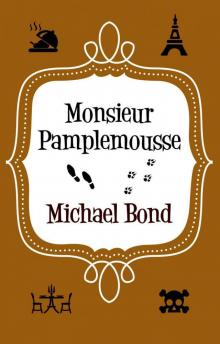 Monsieur Pamplemousse (Monsieur Pamplemousse Series)
Monsieur Pamplemousse (Monsieur Pamplemousse Series) Paddington Here and Now
Paddington Here and Now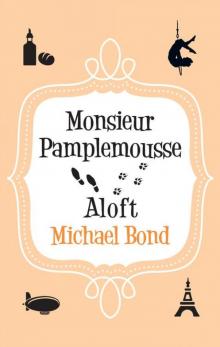 Monsieur Pamplemousse Aloft
Monsieur Pamplemousse Aloft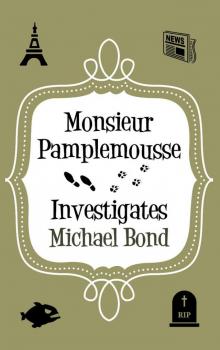 Monsieur Pamplemousse Investigates
Monsieur Pamplemousse Investigates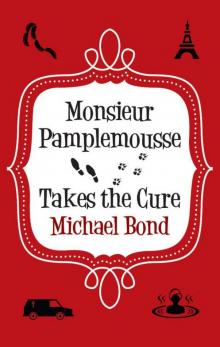 Monsieur Pamplemousse Takes the Cure
Monsieur Pamplemousse Takes the Cure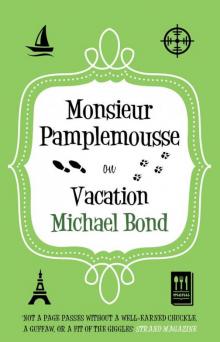 Monsieur Pamplemousse on Vacation
Monsieur Pamplemousse on Vacation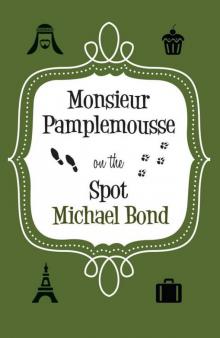 Monsieur Pamplemousse on the Spot
Monsieur Pamplemousse on the Spot Monsieur Pamplemousse Hits the Headlines
Monsieur Pamplemousse Hits the Headlines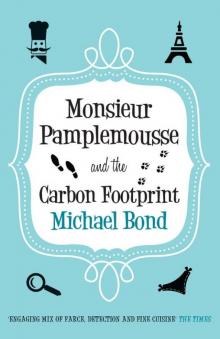 Monsieur Pamplemousse and the Carbon Footprint
Monsieur Pamplemousse and the Carbon Footprint Love from Paddington
Love from Paddington Paddington’s Finest Hour
Paddington’s Finest Hour Paddington Complete Novels
Paddington Complete Novels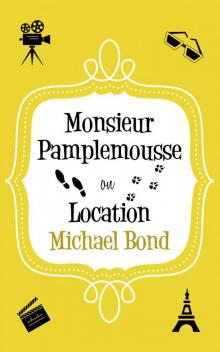 Monsieur Pamplemousse On Location
Monsieur Pamplemousse On Location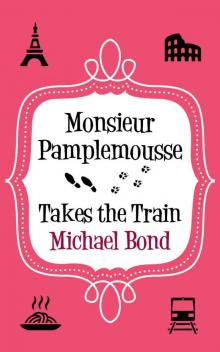 Monsieur Pamplemousse Takes the Train
Monsieur Pamplemousse Takes the Train It Wasn’t Me!
It Wasn’t Me! Paddington Races Ahead
Paddington Races Ahead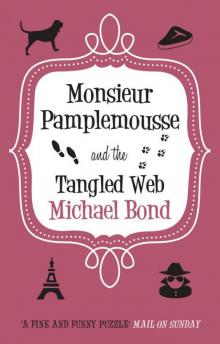 Monsieur Pamplemousse and the Tangled Web
Monsieur Pamplemousse and the Tangled Web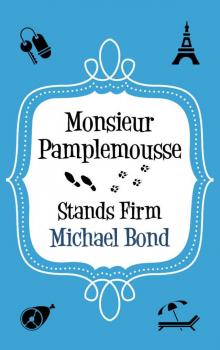 Monsieur Pamplemousse Stands Firm
Monsieur Pamplemousse Stands Firm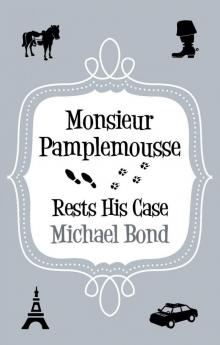 Monsieur Pamplemousse Rests His Case
Monsieur Pamplemousse Rests His Case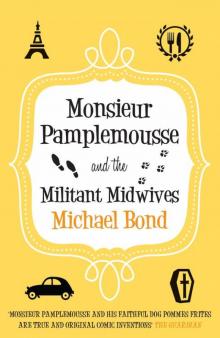 Monsieur Pamplemousse and the Militant Midwives
Monsieur Pamplemousse and the Militant Midwives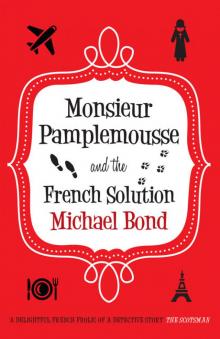 Monsieur Pamplemousse and the French Solution
Monsieur Pamplemousse and the French Solution Paddington Helps Out
Paddington Helps Out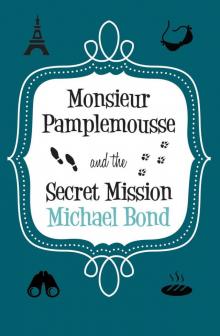 Monsieur Pamplemousse & the Secret Mission (Monsieur Pamplemousse Series)
Monsieur Pamplemousse & the Secret Mission (Monsieur Pamplemousse Series)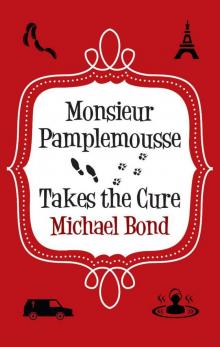 Monsieur Pamplemousse Takes the Cure (Monsieur Pamplemousse Series)
Monsieur Pamplemousse Takes the Cure (Monsieur Pamplemousse Series) A Bear Called Paddington
A Bear Called Paddington